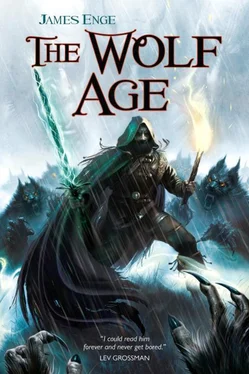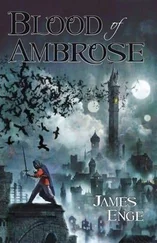Morlock turned toward the guards. The guard with the bow nocked another arrow and held it ready, watching him. The others watched him, too.
He realized they probably understood crow speech. No doubt wolves would find it handy. He could speak to them, then: insult them, threaten them, bribe them, plead with them, acknowledge them as people.
He chose not to. He took the tooth off his wrist and threw it at them: he was not one of them; he would never be one of them; he rejected them. He couldn't tell if they understood. They said or did nothing. But they watched him.
He sat down in the corner of the room and waited.
The day passed noon and headed toward evening. The guards were changed several times during the day, but each set proved as vigilant as the last. They spoke to each other very little and to Morlock never.
In the late afternoon there was a scuffle in the corridor and the tramp of booted feet. Armed guards dragged into Morlock's sight another prisoner: in man form, but clearly a werewolf, from his wedgelike face and crooked legs. His hair was brownish red, and he hadn't shaved for a few days, but he didn't have the full beard of a long-term prisoner.
He took one look at Morlock, at the bloodstained floor, at the laughing faces of the guards, and he began to shriek. Morlock understood no word, but the whole intent. The prisoner was begging not to be put in the cage with that monster. He was sorry; he was very, very sorry; he would never do it again; just please would they put him somewhere else, anywhere else.
There was a long conversation between the prisoner and one of the guards in wolf form. The werewolf seemed to be in charge; he had a great tore of honor-teeth that hung over his chest. Eventually they took the prisoner away without even opening the cell door.
The guards all expressed amusement, and some counters changed hands; apparently they had been betting on how long it would take the prisoner to break.
When the cell began to cool off, Morlock jumped up and slammed the shutter across the window. Then he wrapped himself into as tight a knot as he could in a corner and waited for sleep to come.
He was not one of them. He would not be one of them. But they could still use him, the way they had used the bestial wolfman they had unleashed on Morlock. He was their new beast, their new terror to break prisoners with. There was nothing he could do about that and no way he could think to use it to his advantage.
The darkness, when it came to cover his awareness, was no darker than his mood.
Chapter Six: Dragonkiller
The trustee returned with the healing salve again the next morning. The guards were as vigilant as ever, but the pale trustee seemed less terrified. He entered the cell without being forced and even approached Morlock within arm's reach to hand him the jar of salve.
The trustee seemed disposed to talk, but Morlock took the jar and turned away. He was used to saying nothing for many days at a time; he had often travelled alone in his long life. Further, his last conversation had been with the crow, and that hadn't ended well for the crow. Finally, if the jailors found the pale werewolf trustworthy, then Morlock had to assume the contrary.
His wounds were nearly healed. He examined the jar for some sort of maker's mark: a magical salve would almost certainly require its own unique vessel, and he knew that most adepts were as vain as spoiled children. But there was nothing that Morlock could see-with his eyes, anyway. Again, he felt the loss of his Sight like the loss of a limb.
He looked up to see the trustee's pale eyes on him. He handed back the jar and, as he did so, the pale werewolf said something to him. It was the first time he had heard the pale trustee speak without a background of banter or barking from the other jailors, and Morlock found the werewolf's voice to be oddly resonant and high-pitched-not a male voice or a female voice exactly. Morlock met the other's eye and shook his head to indicate he hadn't understood.
The werewolf spoke again, speaking more slowly. Morlock still understood only one word, or thought he did. It was rokhlan. In the shared language of dragons and dwarves, the language Morlock had grown up speaking, rokhlan meant "dragonkiller"-a title of honor among dwarves that Morlock had earned several times. Did the trustee know him? Did someone here know him? Had he misheard?
He shrugged and turned away. He still didn't trust the trustee. The pale werewolf waited for a few moments, apparently expecting Morlock to engage him again. Morlock began to pace the width of his cell, from stone wall to stone wall, ignoring the other. Eventually, the trustee left. Morlock continued his pacing.
After a month, the wounds were completely healed; even the scars had vanished. Over the month, which must have been the month of Jaric, since the nights were often moonless, the little drama of a prisoner being dragged up to Morlock's cell was several times replayed. Never was it necessary for the jailors to actually throw the prisoners into the cell; they were weeping and babbling as soon as they saw the fearsome beast that awaited them: Morlock. This did not please him, but there was nothing he could do about it. Several times he found the tooth on a cord next to his food and water; every time he tossed it contemptuously into the corridor, and eventually it stopped reappearing.
When he wasn't being used as a threat to terrify werewolves, he paced his cell. As he walked, through the long days when there was nothing else to do, he eyed the confines of his cell, hoping to find some signs of weakness he could exploit. Sadly, there seemed to be none. The building was newish; Morlock guessed it was less than ten years old. The mortar was much stained from moss and filth, but time had not worked its crumbling magic on it. The stones were well shaped and uniform; they seemed to have no flaws he could exploit. His greatest hope was in the ceiling or the floor; those stones could not be as massive as the load-bearing ones in the walls, even if the building was timbered with maijarra wood.
Of course, to exploit any weakness he would need time, tools, and freedom from observation. Time was every prisoner's constant friend and enemy. Tools he could make or acquire somehow. But every time he turned in his pacing he met the eyes of his jailors, staring at him, watching and waiting. As long as they kept that up, he could not escape.
He got to know the walls of the cell quite well, even the individual stones. Some of them displayed strips of texture in the upper right corner; others did not. Some had been scratched at by prisoners; others had not. Most of the prisoners' scratchings he couldn't read, but many of them were obviously tallies of days, calls, months, years. Morlock speculated on what the other symbols meant. And he walked.
One day, he realized that the strips of texture on the corners of some stones were also writing, graven deep into the stone and covered later by moss and mold and other matter. It was long before he could bring himself to stop pacing and scrape away at the filth to see if he could read the words. For one thing, it would let his captors know he was interested in the stones of the wall. For another, it broke the tedious pattern of his pacing, and his idea was to be as boring as possible for his guards so that they would lose interest in watching him. But in the end his curiosity overcame him. He halted by one of the walls and rubbed away at one of the corners.
He found, to his surprise, that he could read it. Moreover, he guessed few others in the world could. It was a piece of Latin, one of his mother's languages.
EGO • IACOMES • FILIVS • SAXIPONDERIS • HAS • CARCERES • FECI • ME • PAENITET • CAPTE
It took him some time to work it out. Latin was one of the languages that his long-dead harven father had made him learn, out of respect for his ruthen parents, but he rarely had use for it. Eventually he decided that this inscription said something like, 1, lacomes, Stoneweight's son, made this prison. Sorry about that, prisoner."
Читать дальше












